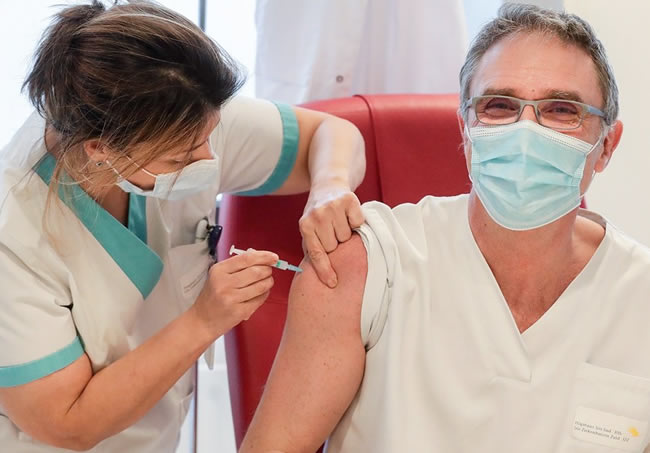« IOC Executive Board proposes Olympic Agenda 2020+5 as the strategic roadmap to 2025 | Main | Switzerland Climbs to Top of Global E-Commerce Index »
February 16, 2021
World Health Organization lists Oxford coronavirus vaccine for emergency use.
• Oxford/AstraZeneca-developed vaccines to reach countries in the coming weeks.


Photo: World Health Organization experts guide the use of the Oxford vaccine. Image credit: WHO / Oxford University.
Geneva, February 15, 2021 - The World Health Organization (WHO) today listed two versions of the AstraZeneca/Oxford COVID-19 vaccine for emergency use, giving the green light for these vaccines to be rolled out globally through COVAX. AstraZeneca-SKBio (Republic of Korea) and the Serum Institute of India produce these vaccines.
WHO’s Emergency Use Listing (EUL) assesses the quality, safety, and efficacy of COVID-19 vaccines and is a prerequisite for COVAX Facility vaccine supply. It also allows countries to expedite their regulatory approval to import and administer COVID-19 vaccines.
“Countries with no access to vaccines to date will finally be able to start vaccinating their health workers and populations at risk. It would contribute to the COVAX Facility’s goal of equitable vaccine distribution,” said Dr. Mariangela Simao, WHO Assistant-Director General for Access to Medicines and Health Products.
But we must keep up the pressure to meet the needs of priority populations everywhere and facilitate global access. To do that, we need two things - a scale-up of manufacturing capacity and developers’ early submission of their vaccines for WHO review.”
The authorization of the Chadox1-nCoV19 vaccine manufactured by AstraZeneca, and the Serum Institute of India (SII), enables global access to the vaccine during the pandemic.
Andrew Pollard, Professor of Paediatric Infection and Immunity, and Chief Investigator on the Oxford vaccine trial said:
‘At the University of Oxford, we are all so pleased by today’s announcement because the emergency use listing from WHO is a critical piece in the path to global access to the Chadox1-nCoV19 vaccine and our mission for vaccines to protect the vulnerable, whoever they are, and wherever they live.’
Today, 2 versions of the AstraZeneca/Oxford #COVID19 vaccine are listed for emergency use, giving the green light for these vaccines to be rolled out globally through #COVAX. The vaccines are produced by AstraZeneca-SKBio 🇰🇷 & the Serum Institute of 🇮🇳
— World Health Organization (WHO) (@WHO) February 15, 2021
👉https://t.co/5NHRcpGxhi pic.twitter.com/BvWM1mrH1S
• World Health Organization experts issue Guidelines on the use of the Oxford Vaccine.
World Health Organization (WHO) Strategic Advisory Group of Experts (SAGE) considers the Oxford coronavirus vaccine safe.
The World Health Organization (WHO) Strategic Advisory Group of Experts (SAGE) produced guidelines for the emergency use of the (ChAdOx1 nCoV-19) coronavirus vaccine developed by the University of Oxford with its partner AstraZeneca.
The WHO has recommended administering two standard doses of the Oxford Vaccine at an 8 to 12-week interval in people aged 18 years and older. Clinical trials have shown that this dosing regimen is safe and effective in preventing symptomatic COVID-19, with no severe cases and no hospitalizations from COVID-19 more than 14 days after the second dose.
The new guidance marks a crucial step towards the Oxford University and AstraZeneca’s goal of providing global access to the vaccine, made available on a not-for-profit basis during the pandemic. This vaccine can be easily transported and stored at domestic fridge temperature (2-8 degrees C). It can be efficiently administered in existing healthcare settings, allowing its rapid deployment worldwide.
Andrew Pollard, Professor of Paediatric Infection and Immunity and Chief Investigator on the Oxford vaccine trial, said: ‘The new guidance from WHO is an important milestone in extending access to the Oxford-AZ vaccine to all corners of the world. The guidance issued after rigorous scrutiny by the WHO Strategic Advisory Group of Experts provides further endorsement that this vaccine can help protect populations from the coronavirus pandemic.’
Sarah Gilbert, Professor of Vaccinology and an Investigator on the Oxford vaccine trial, said: ‘It is excellent news that the WHO has recommended using the SARS CoV-2 vaccine first produced in Oxford. This decision paves the way to the more widespread use of the vaccine to protect people against COVID-19 and gain control of the pandemic.’
• The WHO Strategic Advisory Group of Experts on Immunization (SAGE) has issued interim recommendations for using the Oxford/AstraZeneca COVID-19 vaccine (AZD1222).
• Who should be vaccinated first?
While vaccine supplies are limited, it is recommended that priority be given to health workers at high risk of exposure.
Countries can refer to the WHO Prioritization Roadmap and the WHO Values Framework as guidance for prioritizing target groups.
• Who else can take the vaccine?
Vaccination is recommended for persons with comorbidities that have been identified as increasing the risk of severe COVID-19.
Vaccination can be offered to people who have had COVID-19 in the past. But individuals may wish to defer their COVID-19 immunization for up to six months from the time of SARS-CoV-2 infection to allow others who may need the vaccine more urgently to go first.
• Who is the vaccine not recommended for?
People with a history of a severe allergic reaction to any vaccine component should not take it.
The vaccine is not recommended for persons younger than 18 years of age, pending further studies.
• What’s the recommended dosage?
The recommended dosage is two doses given intramuscularly (0.5ml each) with an interval of 8 to 12 weeks.
Additional research is needed to understand potential longer-term protection after a single dose.
• Is it safe?
While this vaccine has yet to be recommended for an Emergency Use Listing by WHO, it has undergone review by the European Medicines Agency (EMA). Consequently, it meets WHO’s criteria for SAGE consideration.
The EMA has thoroughly assessed the data on the quality, safety, and efficacy of the vaccine and has recommended granting conditional marketing authorization for people aged 18 and above.
The Global Advisory Committee on Vaccine Safety is a group of experts that provides an independent and authoritative guide to the WHO on safe vaccine use. It receives and assesses reports of suspected safety events of potentially global impact.
• How efficacious is the vaccine?
The AZD1222 vaccine against COVID-19 has an efficacy of 63.09% against symptomatic SARS-CoV-2 infection.
Longer dose intervals within the 8 to 12 weeks range are associated with greater vaccine efficacy.
• Does it work against new variants?
SAGE has reviewed all available data on the vaccine’s performance in the settings of variants of concern. SAGE currently recommends the use of the AZD1222 vaccine according to the WHO Prioritization Roadmap, even if virus variants are present in a country. Countries should assess the risks and benefits, taking into consideration their epidemiological situation.
• Does it prevent infection and transmission?
No substantive data are available related to the impact of AZD1222 on transmission and viral shedding.
• In the meantime, we must maintain and strengthen public health measures that work: masking, physical distancing, handwashing, respiratory and cough hygiene, avoiding crowds, and ensuring adequate ventilation, the WHO concluded.
Source: University of Oxford / WHO
|GlobalGiants.Com|
— The Editor holds an Oxford Alumni Card.







Edited & Posted by the Editor | 5:39 AM | Link to this Post







